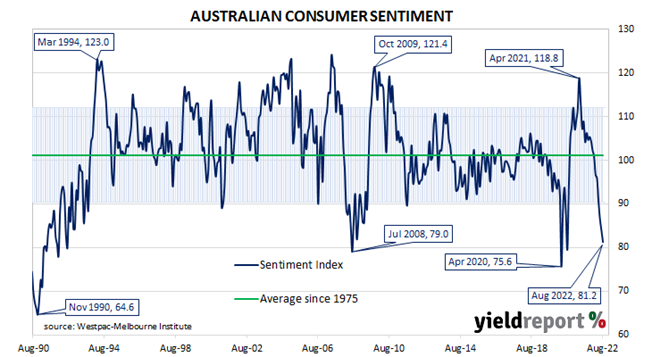Summary: Household sentiment deteriorates for ninth consecutive month in August; on par with lows of COVID, GFC; three of five sub-indices lower; respondents less concerned by prospects of unemployment.
After a lengthy divergence between measures of consumer sentiment and business confidence in Australia which began in 2014, confidence readings of the two sectors converged again in mid-July 2018. Both measures then deteriorated gradually in trend terms, with consumer confidence leading the way. Household sentiment fell off a cliff in April 2020 but, after a few months of to-ing and fro-ing, it then staged a full recovery. However, consumer sentiment has deteriorated significantly over the past year, while business sentiment has been more robust.
According to the latest Westpac-Melbourne Institute survey conducted in the first week of August, household sentiment has deteriorated for a ninth consecutive month. Their Consumer Sentiment Index declined from July’s reading of 83.8 to 81.2, a reading which is well below the range of “normal” readings and significantly lower than the long-term average reading of just over 101.
“This reading is on a par with the lows of COVID and the Global Financial Crisis, although still well above the lows during the late 80’s / early 90’s recession,” said Westpac Chief Economist Bill Evans.
Any reading of the Consumer Sentiment Index below 100 indicates the number of consumers who are pessimistic is greater than the number of consumers who are optimistic.
Long-term Commonwealth Government bond yields moved lower on the day. By the close of business, the 10-year ACGB yield had lost 3bps to 3.21% and the 20-year yield had shed 5bps to 3.52%. The 3-year yield remained unchanged at 3.03%.
In the cash futures market, expectations of higher rates firmed a touch. At the end of the day, contracts implied the cash rate would rise from the current rate of 1.81% to 2.155% in September and then increase to 2.955% by November. May 2023 contracts implied a 3.465% cash rate and August 2023 contracts implied 3.455%.
Three of the five sub-indices registered lower readings, with the “Time to buy a major household item” sub-index posting the largest monthly percentage loss. The reading of the “Family finances – next 12 months” sub-index increased modestly while the “Family finances versus a year ago” remained essentially unchanged.
The Unemployment Expectations index, formerly a useful guide to RBA rate changes, fell from 109.8 to 103.4. Lower readings result from fewer respondents expecting a higher unemployment rate in the year ahead.



